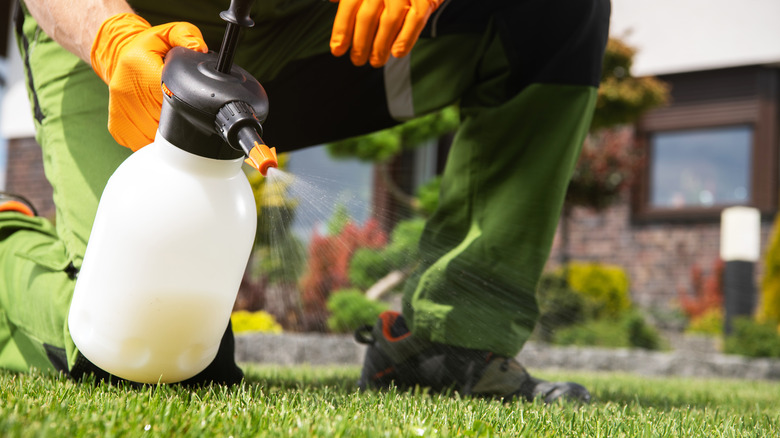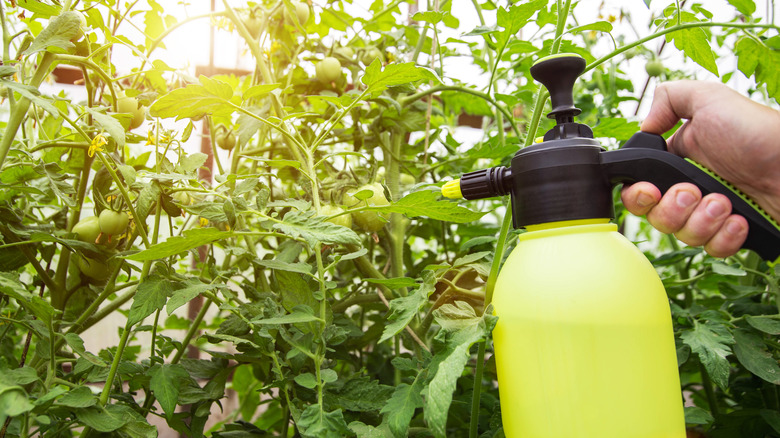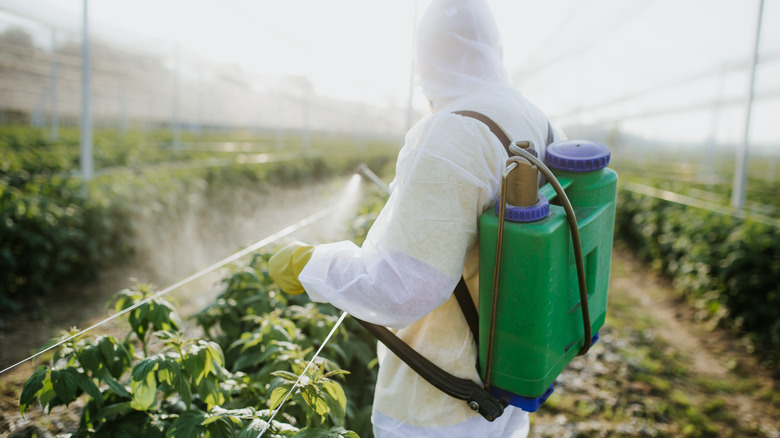You May Want To Think Twice Before Using This Product To Wipe Out Crabgrass
Numerous websites have promoted the use of ammonia, which is frequently present in many household cleaning products, as a successful method for getting rid of crabgrass. In cleaning products, ammonia is often found as ammonium hydroxide, which is essentially ammonia mixed with water. Scientific research shows that ammonia hydroxide, along with other ammonia derivatives like ammonium sulfate, can be effective weed killers. However, this same property can inadvertently damage or kill the plants you want to keep. The harm isn't just limited to the foliage above ground; it extends to the roots, potentially affecting your lawn's overall health and future growth.
Furthermore, using household ammonia in your yard is risky due to the variable chemical concentrations in these products. The amount of ammonium hydroxide can be inconsistent. This makes it challenging to know the exact potency of the solution you're applying to your lawn. The temptation to use a readily available household product to solve a persistent gardening problem is understandable. However, the risks involved, both to your plants and the broader environment, suggest that it might not be the best solution. When you're using ammonia, remember that it's not just about what's happening on the surface. You're dealing with a whole system — the soil, the plants, and even the unseen micro-world that keeps your garden healthy. Moreover, there are more manageable alternatives you can consider for effective weed management.
How ammonia affects plants
Ammonium can damage a plant's tissue and roots. These structures are essential for water transport within the plant. Plants struggle to efficiently absorb water when ammonia's toxic effects are present. This disruption manifests visibly as wilting, where the plant appears limp, lifeless, and stunted, showing that its development is hindered. In severe cases, this can lead to the death of the plant. And, here's something else to keep in mind. If ammonia runs off into a pond or lake, aquatic plants are also at risk since they can absorb the chemical directly. However, most plants can't get rid of it, and the buildup can be lethal, essentially poisoning the plant from the inside out.
The impact of ammonia extends beyond the affected plants to the soil in which they grow. Soil is a complex ecosystem that relies on a delicate balance of pH levels and microbial activity. Ammonia, rich in nitrogen, can significantly alter this balance. Excessive nitrogen can change the soil's pH level, making it too acidic or alkaline for most plants to thrive. This shift in pH can be detrimental to the beneficial microorganisms, reducing their numbers and leading to reduced soil fertilityAmmonia's influence on seed germination is another significant concern. High levels of ammonia in the soil can inhibit the germination process of seeds. Seeds may not sprout at all, or if they do, they may exhibit poor growth and development.
Safest practices for using ammonia in your garden
If you're set on using ammonia to tackle weeds in your garden, you will need to dilute the solution. But as mentioned, there isn't enough trusted information online regarding mixing and ratio. So it's all about trial and error. You'll want to test on a small area first. When you've got your diluted solution, it might be best to use it as a spray for a more targeted approach. However, be mindful of where you're spraying since the solution may spread beyond the intended area.
While ammonia can be a quick fix, it's worth considering other proven herbicides for tackling crabgrass. Products like quinclorac and sethoxydim are specifically formulated for crabgrass. More so, these herbicides may be easier to use because the instructions are clear, and the amounts are easier to measure. This takes out a lot of the guesswork and reduces the risk of damage to your lawn and the surrounding environment. Using these specialized herbicides also means you're applying a product designed for the specific problem you're dealing with. They target crabgrass effectively without the broader, potentially harmful effects of a general substance like ammonia.


